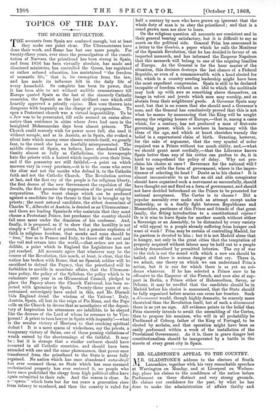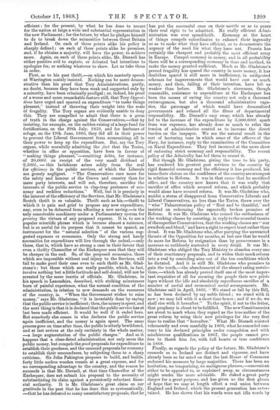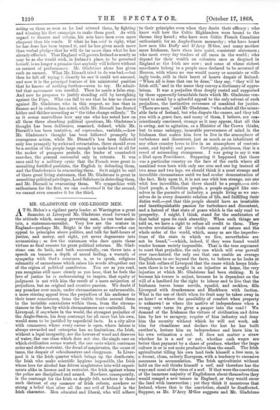MR. GLADSTONE'S APPEAL TO THE COUNTRY.
AA R. GLADSTONE'S address to the electors of South ilk Lancashire, together with his very remarkable speeches at Warrington on Monday, and at Liverpool on Wednes- day, place his claims to the confidence of the nation before Parliament on three distinct and very strong grounds. He claims our confidence for the past, by what he has done to make the administration of affairs thrifty and the new Parliament ; for the future, by what he pledges himself to do to break down the animosities between Great Britain and Ireland. On each of these points alike his policy is sharply defined ; on each a these points alike he promises, .and, if he obtains a majority, will have the power, to achieve more. Again, on each of these points alike, Mr. Disraeli has either positive evil to expiate, or defeated bad intentions to apologize for, or nothing whatever to show. Let us take them in order.
First, as to his past thrift,—on which his masterly speech at Warrington mainly insisted. Nothing can be more demon- strative than his proof that Tory Administrations, partly, no doubt, because they have been weak and supported only by a minority, have been criminally prodigal ; or, indeed, his proof of a worse and more remarkable feature still, that Tory Opposi- tions have urged and spurred on expenditure "to make things pleasant," instead of throwing their weight into the scale of frugality. The Tory organs are evidently unable to deny this. They are compelled to admit that there is a germ of truth in the charge against the Conservatives,—that by insisting, for example, on the sudden raising of a large fund for fortifications, on the 29th July, 1859, and for harbours of refuge, on the 19th June, 1860, they did all in their power to prevent the Liberal Government from economizing, all in their power to keep up the expenditure. But, say the Tory organs, while scornfully admitting the fact that the Tories, whether in office or opposition, have been in favour of "making things pleasant,"—remitting debts, for instance, of 20,000/. on receipt of the very small dividend of 2,500/., — this lavishness arises solely from the zeal for effici ency in the public services, of which the Liberals are grossly negligent. "The Conservatives care more for the safety and honour of the Crown and country than for mere party interests, and will not, therefore, sacrifice the interests of the public service to clap-trap pretences of eco- nomy and reckless reductions." Well, but it is precisely in the interest of the efficiency of the Services, that Mr. Gladstone's Scotch thrift is so valuable. Thrift such as his,—thrift to which it is pain and grief to propose any new expenditure, nay, even to be debarred from effecting a new saving,—is the only conceivable machinery under a Parliamentary system for proving the virtues of any proposed expense. It is, to use a popular scientific phrase which is become almost a nuisance, but is so useful for its purpose that it cannot be spared, an instrument for the "natural selection" of the various sug- gested expenses or economies. Only the strong and hardy necessities for expenditure will live through the ordeal,—only those, that is, which have so strong a case in their favour that even a thrifty Chancellor of the Exchequer sees that they will be cheaper in the end. So, of the proposed economies, those which are impossible without real injury to the Services, will fail to make good their case even to such thrift as Mr. Glad- stone's ; but those which are really possible, which, in fact, involve nothing but a little fortitude and self-denial, will not be arrested by the mere inertia of officials. Mr. Gladstone, in his speech in Lancashire, described, with striking minuteness horn of painful experience, what the normal condition of the administration, in relation to new demands on the resources of the country, is. "When the Government wishes to raise money," says Mr. Gladstone, "it is invariably done by saying that the public service is inefficient; then, the money is spent, and the next thing is that it is declared that the public service has at last been made efficient. It would be well if it ended here. But somebody else comes in who declares the public service again inefficient, and the money is again spent. The same process goes on time after time, the public is utterly bewildered, and at last arrives at the only certainty in the whole matter, —a large augmentation of the public charges." And so it Lappens that a close-fisted administration not only saves the public money, but compels the good proposals for expenditure to establish their goodness, and the unsound proposals for economy to establish their unsoundness, by subjecting them to a sharp criticism. Sir John Pakington proposes to build, and builds, forty little useless wooden vessels at a great expense, and for no corresponding advantage to the country, and the reason he succeeds is that Mr. Disraeli, at that time Chancellor of the Exchequer, does not submit his proposal to the necessity of substantiating its claim against a persistently reluctant finan- cial authority. It is Mr. Gladstone's great claim on our gratitude in the past that he has done this so systematically, —that he has defeated so many unsatisfactory proposals, that he has put the successful ones on their mettle so as to prove their real right to be admitted. No really efficient Admi- nistration was ever spendthrift. Economy at the heart of things compels subordinates to exhaust their ingenuity so as to make what they have efficient, or to demonstrate the urgency of the need for what they have not. Prussia has certainly the cheapest and probably the most efficient army in Europe. Compel economy in money, and in all probability there will be a corresponding economy in time and method, to make the money granted sufficient, Much as Mr. Gladstone's proved frugality has spared the country in mere money, it has doubtless spared it still more in inefficiency, in undigested schemes for improvements that would have cost us much money, and then, failing of their intention, have left us weaker than before. Mr. Gladstone's strenuous, though reasonable, resistance to expenditure at the Exchequer has been the means of saving the country not only a thousand extravagances, but also a thousand administrative vaga- ries, the patronage of which would have demoralized governments and relaxed all the fibres of departmental responsibility. Mr. Disraeli's easy sway, which has already led to the increase of the expenditure by 3,000,000/. apart from war expenses, has already done as much to relax the tension of administrative control as to increase the direct burden on the taxpayer. We see the natural result in the sort of hectoring tone in which some of the officers of the Navy, for instance, reply to the examination of the Committee on Naval Expenditure. They feel incensed at the mere show of enforcing strict economy and responsibility. The recent policy of the Admiralty has led them to resent it.
But though Mr. Gladstone, giving the tone to his party, has rendered his greatest past services to the country by rigid financial economy and the efficiency it has produced, his immediate claims on the confidence of the country are strongest in relation to Reform. It was in that cause that he sacrificed office, and the country now knows that it was really that sacrifice of office which secured reform, and which probably would alone have secured reform. It was Mr. Gladstone who, amidst a storm of disapproval from Conservative Liberals and Liberal Conservatives, no less than the Tories, threw over the " wise " Palmerstonian policy of "Rest and be thankful," and insisted on redeeming the repeatedly broken promises of Reform. It was Mr. Gladstone who roused the enthusiasm of the working classes by asserting, in reply to the scornful taunts of the superfine Conservatives, that the working classes are" our own flesh and blood," and have a right to expect trust rather than dread. It was Mr. Gladstone who, after parrying the unwearied thrusts of the Opposition for months, at last saw that he would do more for Reform by resignation than by perseverance in a measure so ruthlessly contested in every detail. It was Mr. Gladstone who obliged the Tory Ministry to abandon every one of their reactionary proposals, and to widen their mock reform into a real by conceding nine out of the ten conditions which he dictated. And it is still Mr. Gladstone who promises to gain the tenth,—the abandonment of the absurd rating restric- tions,—which has already proved itself one of the most impor- tant requisites of all for securing the people their new privi- leges without the idle and absolutely superfluous sacrifice of a number of useful and economical social arrangements. Mr. Gladstone said in April, 1866, "We stand or fall by this Bill, as has been declared by my noble friend ; we stand with it now ; we may fall with it a short time hence ; and if we do, we shall rise with it hereafter." To the spirit, if not to the letter, that prophecy is about to be fulfilled. The new Constituencies are about to mark whom they regard as the true author of the great reform by using their new privileges for the very first time to realize that "hereafter." What Mr. Disraeli resisted vehemently and even manfully in 1866, what he conceded con- trary to his declared principles under compulsion and with mischievous qualifications in 1867, the people cannot pro- fess to thank him for, with full hearts or true confidence in 1868.
Finally, as regards the policy of the future, Mr. Gladstone's counsels as to Ireland are distinct and vigorous, and have already been so far acted on that the last House of Commons endorsed his measure by large majorities. There has been no hesitation, no temporizing, no ambiguous phrases,—convenient either to be appealed to, or explained away, as circumstances might render the more advisable. He risked a great party danger for a great purpose, and has given us the first gleam of hope that we may at length effect a real union between England and Ireland, which the present generation has enter- tained. He has shown that his words were not idle words by acting on them as soon as he had uttered them, by fighting and winning his first campaign to make them good. As with regard to finance and reform, his acts have been even more eloquent than his words. If what he has said is right, what he has done has been beyond it, and he has given much more than verbal pledges that he will do far more than what he has already effected. That England will govern Ireland as nearly as may be as she would wish, in Ireland's place, to be governed herself, is no longer a promise that anybody will believe without an earnest of performance. Mr. Gladstone alone has given such an earnest. What Mr. Disraeli tried to do was bad,—but then he left off trying it directly he saw it could not succeed, and now it is the principal feature of his ministerial position that he knows of nothing farther—even to try. He admit- ted that movement was needful. Then he made a false step. And now he proposes to justify standing still by inveighing against the Pope. Who can fail to see that he has no chance against Mr. Gladstone, who in this respect, no less than in finance and in reform, has acted, while Mr. Disraeli has floated hither and thither according as " the tides change sullenly." To us it seems marvellous how any one who has noted how on all these three absorbing political questions, Mr. Gladstone's thought has been deliberate, reasoned, defined, while Mr. Disraeli's has been tentative, ad eaptandwn, variable,—how Mr. Gladstone's thought has been followed promptly by courageous action, while Mr. Disraeli's has been followed only less promptly by awkward retractation, there should even be a section of the people large enough to make head at all for the maker of pompous periods, the leader of counterfeit marches, the general successful only in retreats. It was once said by a military cynic that the French were great in assaulting fortified positions, the English in defending them, and the Confederates in evacuating them. So it might be said of three great living statesmen, that Mr. Gladstone is great in assaulting political privileges, Lord Salisbury in defending them, and Mr. Disraeli in evacuating them. We sympathize with enthusiasm for the first, we can understand it for the second, we cannot even conceive it for the third.




































 Previous page
Previous page